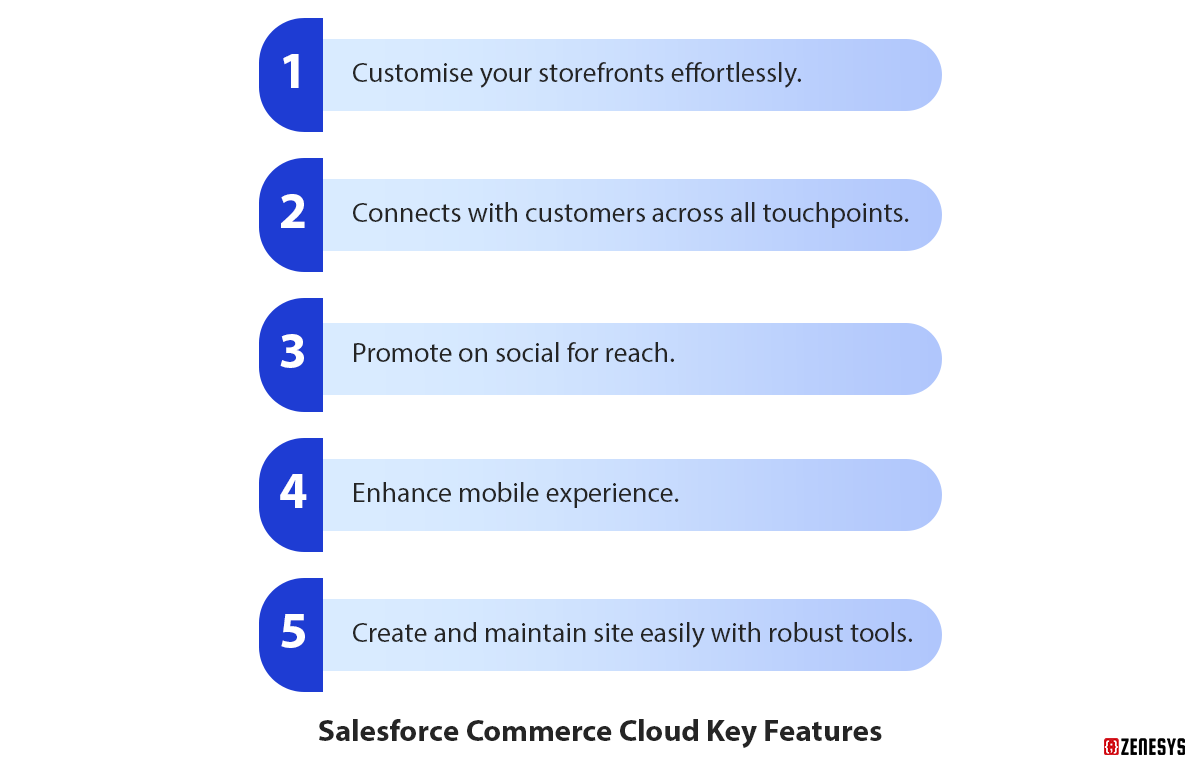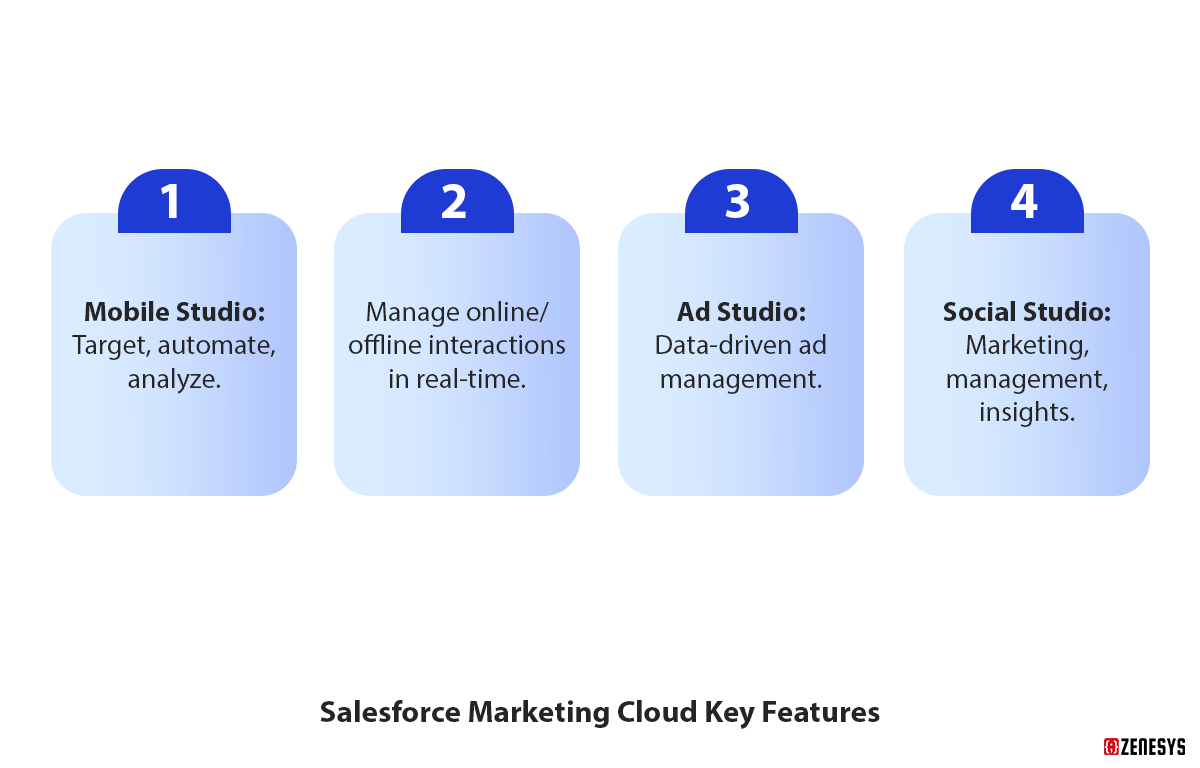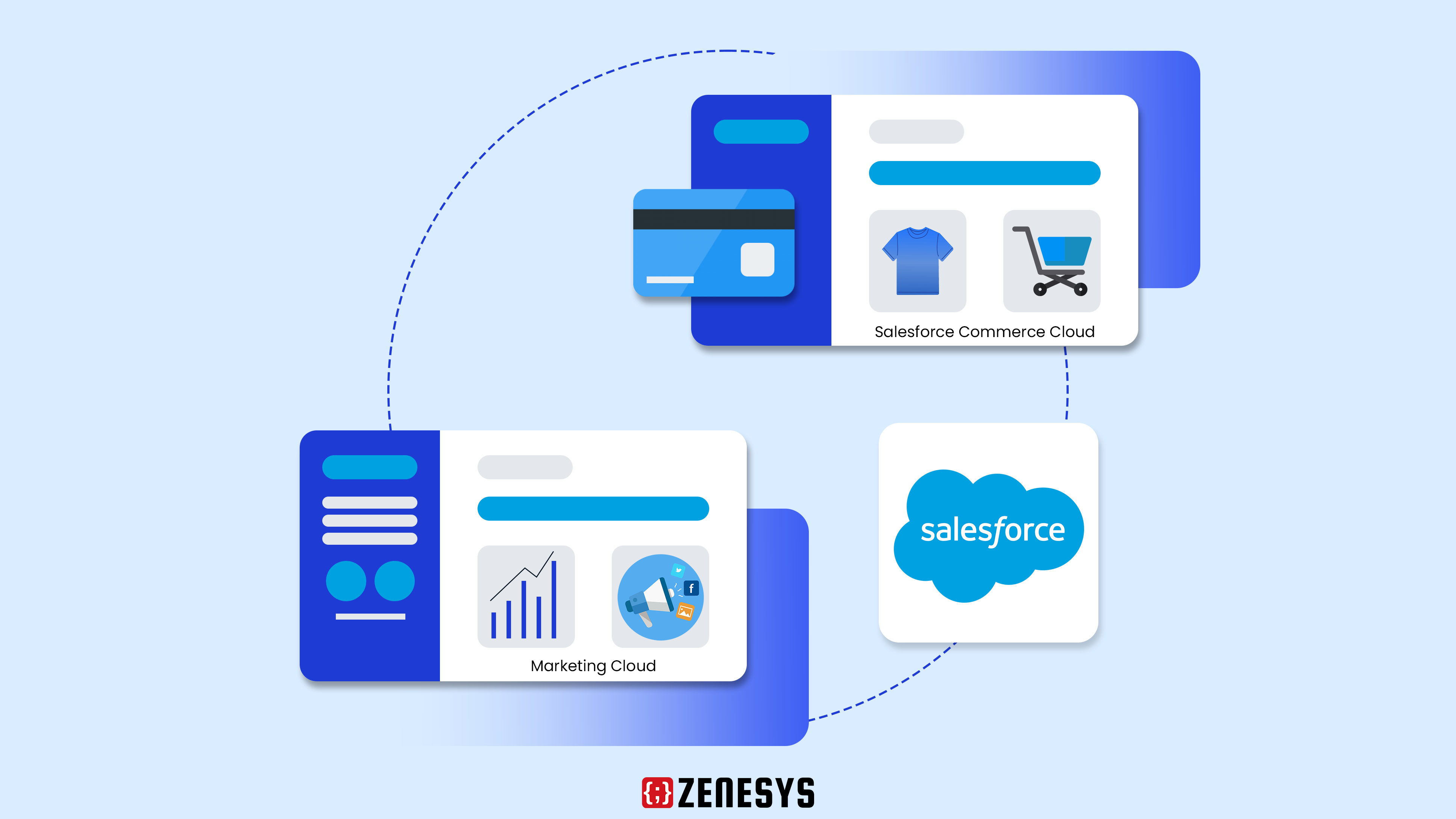Business development is not without hurdles, and clients may encounter issues such as website usability, delivery troubles, and product quality concerns. Addressing these difficulties is critical for increasing customer happiness and sales.
Salesforce Commerce Cloud and Salesforce Marketing Cloud, frequently confused as twins, address these issues. To someone unfamiliar with Salesforce, they may appear to be two sides of the same coin.
However, they reflect distinct phases of your customer acquisition cycle.
The Commerce Cloud aims to improve revenue and facilitate your sales processes. The Marketing Cloud aims to educate potential customers about your goods and services, nurture leads, and turn them into prospects. In this post, you will discover their main differences and which is ideal for your company.
Before we examine the differences, let's look at what Commerce and Marketing Cloud have in common. Let's get started.
Also Read : What is Salesforce Sales Cloud? Top 10 Things You Need to Know About Salesforce
Salesforce Commerce Cloud and Marketing Cloud share similarities.
Commerce and Marketing Cloud enables companies to track leads and convert them into customers. These clouds use distinct methodologies, but at their heart, both work to improve the client acquisition process.
Furthermore, both employ data analytics for customer interaction, decision-making, and future business expansion. Although the emphasis of Commerce Cloud is to close deals and Marketing Cloud is to identify prospects, both aim to improve the customer experience.
Commerce and Marketing Clouds are part of a single ecosystem, allowing for connection with one another and other Salesforce applications. This interconnection will enable commerce and marketing teams to exchange information and ideas more efficiently.
Salesforce Commerce Cloud Overview
Salesforce Commerce Cloud, originally Demandware, is a cloud-based e-commerce platform for organizations striving to design and extend their online presence. It offers a cohesive shopping experience across several channels, such as web, mobile, social, and in-store, allowing companies to create individualized experiences at every touchpoint.
Salesforce Commerce Cloud is a unique capability within the Salesforce CRM Development Services. It is designed exclusively for a company's sales force, regardless of industry (B2B or B2C). Sales teams utilize this software to handle all the sales department's processes.
Commerce Cloud can help you with anything from lead generation to customer retention. It also allows you to develop campaigns, manage leads' contacts and accounts, automate messages and reports, etc.
Like the rest of the CRM suite, Commerce Cloud is fully customizable. Your team can use the entire program and execute their sales activities however suitable.
Salesforce Commerce Cloud is a central center for all your client information. It addresses several parts of marketing, lead creation, sales, customer service, and analytics.
Salesforce Commerce Cloud developer now provides eCommerce solutions for businesses of all sizes and sorts, allowing them to sell their products online effectively.
According to Statista, till September 2024, over 5,700 live stores were running on Salesforce Commerce Cloud worldwide. Out of these, roughly 1,500 were owned by apparel retailers. Home and garden stores came next with 476 sites, while beauty and fitness brands made up the third most popular category on the platform.
Key features:

- Offers configurable templates, themes, and APIs, allowing businesses to develop distinctive storefronts that represent their brand identity and meet specific requirements.
- Salesforce Commerce Cloud enables you to engage with your customers through all conceivable physical and digital touchpoints.
- With Commerce Cloud, you can promote your online store on social media and reach a larger audience.
- You may also improve mobile payment and search, reduce cart abandonment, and create your own branded app to enhance the customer experience on mobile.
- This robust framework allows you to create a customized, professional website quickly. You may successfully maintain your website by using pre-designed wireframes, incorporating digital innovation technologies, and valued integrations for adjustments.
Case Studies:
The success story of UGG, a well-known footwear brand, exemplifies Salesforce Commerce Cloud in action. By adopting Commerce Cloud, UGG raised conversion rates by 1.5-2.0% and average order value by 30% and 17% which is $100-125, respectively. UGG's global e-commerce platforms can now offer personalized shopping experiences, optimize procedures, and enhance income thanks to this technology.
Insights:
- According to Salesforce's Shopping Index, organizations that use Commerce Cloud experience an average annual sales growth rate of 21%.
- Personalization is crucial for increasing e-commerce sales, with 79% of consumers indicating they are more likely to engage with offers personalized to their needs.
Salesforce Marketing Cloud Overview
As the name implies, the Marketing Cloud is an extension of your marketing team. This software helps marketing organizations identify leads, maintain connections, and perform customer campaigns. It enables marketers to design targeted, data-driven campaigns that engage audiences and promote meaningful interactions throughout the customer journey.
This SaaS provides a variety of capabilities, including messaging automation, social media marketing, data analytics, real-time interaction management, and much more.
Data management is one of the most essential parts of adopting Marketing Cloud. Salesforce marketing cloud developer enables you to store diverse consumer data and develop your data model. Marketing Cloud can integrate with a variety of third-party applications.
Salesforce also has an in-house rival for Marketing Cloud - Pardot. It's a specialized marketing and email automation service. While both have similar capabilities, Pardot excels at B2B marketing, making it the best option for businesses looking to improve their B2B marketing tactics.
According to 6sense, In terms of market share, Salesforce Marketing Cloud holds approximately 0.50% in the marketing automation platforms category, ranking it 22nd among its competitors. Despite this, it faces stiff competition from leading platforms such as MailChimp, Klaviyo, and HubSpot Marketing Hub, which command larger portions of the market.
Marketing Cloud, like other CRM suite components, is completely customizable. Your team can customize the program to match your specific marketing strategies exactly.
Key features:

- Salesforce Marketing Cloud Mobile Studio enables you to build and deploy highly targeted mobile messaging. It allows you to target specific audiences, automate message delivery, and analyse and track engagement.
- Salesforce Marketing Cloud Interaction Studio enables you to coordinate online and offline consumer interactions with real-time interaction management. It lets you direct your consumers through the right purchasing path and connects to offline interactions such as call centres and ATMs.
- Salesforce Marketing Cloud Advertising Studio uses customer data to drive digital advertising on social media. It enables you to manage ad campaigns at scale.
- Salesforce Marketing Cloud Social Studio is an all-in-one social media marketing and management platform. It facilitates the connection of social data to marketing efforts by converting it into a digital focus group.
Case Study:
The success story of Yeti, a premium outdoor company, is an excellent illustration of Salesforce Marketing Cloud in action. Yeti saw a 63% boost in mobile conversation rate and a 22% rise in online revenue after implementing Marketing Cloud. The technology helped Yeti offer targeted, personalized advertising that connected with their target audience, increasing brand loyalty and revenue.
Insights:
- According to Salesforce's State of Marketing study, 84% of customers believe that being treated like an individual rather than a number is critical to winning their business.
- According to McKinsey, data-driven marketing tactics enhance marketing ROI by an average of 15-20%.
Main differences between Salesforce Commerce Cloud vs Salesforce Marketing Cloud.
Salesforce Commerce Cloud and Salesforce Marketing Cloud have two major distinctions. Salesforce Marketing Cloud is a single marketing platform that helps businesses understand and communicate with their customers and personalize their experiences.
Salesforce Commerce Cloud is the world's number-one CRM sales app. It makes everything you need conveniently available anytime and from any location.
It's simple to implement, encompassing everything from social media sites and contacts to mobile devices, chat apps, analytics, company-wide association, and ensuring speedy deal closures.
While the Salesforce Sales Cloud is primarily classified as "CRM," the Salesforce Marketing Cloud falls under the "Marketing Automation" category: the tech stack.
| Comparison | Commerce Cloud | Marketing Cloud |
|---|---|---|
| Main Focus | Overall sales management. It handles everything, from leads to income. | Concentrates on marketing, customer involvement, and campaigns. |
| Functions | It manages leads, accounts, contacts, and opportunity management. | Oversees social media and email marketing, advertising, and automation |
| Analytics and Reporting | Sales process automation (for example, lead assignment, opportunity monitoring, and sales forecasting) | Metrics for sales include pipeline tracking, conversion rates, sales predictions, and so forth. |
| Automation | Advanced marketing automation (including journey mapping and email campaigns) | Email open rates, click-through rates, ad ROI, and other marketing metrics. |
Also Read : Sales Cloud Vs. Service Cloud – What are the Key Differences?
Selecting the Ideal Solution for Your Business
While both Salesforce Commerce Cloud and Marketing Cloud provide significant features for improving customer experiences and driving business growth, the decision between the two is ultimately based on your specific goals and priorities.
You now understand how Salesforce Commerce Cloud and Marketing Cloud differ and their similarities. However, which one should you invest in? The specifics of your firm determine this. Here's a quick tutorial to help you:
#1. You should choose Salesforce Commerce Cloud.
- If you want to improve your sales funnel (in terms of quality and speed), close more deals, and increase income.
- If you want to improve your lead management, opportunity monitoring, and sales analytics to speed up the process.
- If your firm demands one-on-one sales contacts and targeted customer booking techniques.
- Facilitating smooth purchases across various media is your primary area of interest in e-commerce.
- If your online business depends on scalable infrastructure, personalized recommendations, and omni-channel commerce.
#2. You should choose Salesforce Marketing Cloud.
- If you want to increase reach, generate leads, and grow your customer base through targeted channels.
- If you want to improve your company's digital presence and communicate with customers through tailored marketing campaigns.
- If you want to automate marketing operations, supply content, and monitor campaign performance.
- If your primary goal is to optimize marketing campaigns, communicate with customers through digital channels, and increase conversions.
- If you need email marketing, social media management, journey automation, and data analytics solutions to orchestrate personalized customer journeys efficiently.
Integration Opportunities
Salesforce Commerce and Marketing Cloud may be effortlessly connected to build a single platform for end-to-end customer engagement. By integrating the characteristics of both systems, organizations may use e-commerce transaction data to create targeted marketing initiatives, resulting in more personalized and meaningful consumer experiences.
Also Read: 5 Key Benefits of Integrating Salesforce Development in 2024
Can you use both together?
Absolutely! Salesforce is widely recognized as the world's top and most popular CRM solution. There are several causes for this, one of which is integration. Salesforce allows all of its products to interface with other Salesforce solutions easily.
It is possible to combine Commerce Cloud with Marketing Cloud. Most organizations, however, require one of the choices. The Commerce Cloud is more common among enterprises than the Marketing Cloud, even though the two clouds offer distinct use cases.
According to Backlinko, Salesforce Common Cloud generates $5.19 billion in revenue, while Marketing and Commerce Cloud generates $3.13 billion.
Conclusion
Salesforce Commerce Cloud and Marketing Cloud provide robust solutions for businesses aiming to increase engagement, boost sales, and develop long-term client relationships. Whether you prioritize generating ideal shopping experiences or coordinating tailored marketing efforts, using the correct platform can help you meet your business goals and stay ahead of the digital curve.
Understanding the unique capabilities, benefits, and use cases of Salesforce Commerce Cloud and Marketing Cloud allows you to make an educated finding that suits your requirements while setting your organization for long-term growth and success.
Salesforce Commerce Cloud and Marketing Cloud are both excellent tools for businesses looking to succeed in the digital age, and your individual goals and priorities determine the best platform for your needs.
FAQs:
- Is Salesforce Marketing Cloud the same as Commerce Cloud?
No, they're not. Marketing Cloud has enhanced its customer data platform to include real-time engagement, audience segmentation, and loyalty management.
Commerce Cloud provides new data interfaces, enhances order administration, and offers headless commerce tools, allowing organizations to develop swiftly with clicks rather than coding.
- What's the distinction between Salesforce Commerce Cloud and Marketing Cloud?
Salesforce Commerce Cloud is designed to close sales and generate revenue, whereas Salesforce Marketing Cloud is intended to generate leads and guide customers to your product or service.
- What's the difference between Salesforce and Salesforce Commerce Cloud?
Salesforce Commerce Cloud is the B2C eCommerce platform, while Salesforce Core is primarily their CRM system (previously known as Demandware). The tech stack for SFCC includes Javascript.
SFCC has all the standard e-commerce functions, including search, product display, shopping cart, and checkout.
- Is Marketing Cloud different from Salesforce?
Yes, the Marketing Cloud plays a major role in the Salesforce Customer Success Platform.
It forms part of the Customer Success Platform with the Sales Cloud, Service Cloud, Community Cloud, Analytics Cloud, and App Cloud.




.webp?lang=en-US&ext=.webp)

.webp?lang=en-US&ext=.webp)

